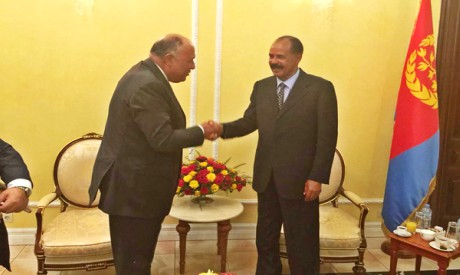
Egyptian Foreign Minister Sameh Shoukri (L) shakes hands with Eritrean President Isaias Afwerki during their meeting on September 13, 2018 in Asmara (Photo: The Egyptian Foreign Ministry's official Facebook page)
Egyptian Foreign Minister Sameh Shoukri met Eritrean President Isaias Afwerki last week in Asmara.
It was Shoukri’s first visit to the country after it restored diplomatic relations with neighbouring Ethiopia after nearly 20 years of enmity that included a two-year border war.
Egypt has always kept steady relations with Eritrea on the political and economic levels.
However, according to Mohamed Higazi, former assistant to Egypt’s foreign minister, the relationship gained a new dimension after the recent rapprochement between Eritrea and Ethiopia.
The deal was warmly welcomed by Saudi Arabia which awarded Ethiopia’s Prime Minister Abiy Ahmed and Afwerki the kingdom’s highest medal on Sunday in recognition of the efforts by the two leaders to bring peace to the two countries.
The event was hosted by Saudi King Salman in Jeddah and in the presence of UN Secretary-General Antonio Guterres.
The two leaders had been awarded similar gold medals in the United Arab Emirates by Crown Prince Mohamed bin Zayed in July for the same purpose.
Eritrea is located near Bab Al-Mandeb, a shipping checkpoint on the Red Sea used by oil tankers and other cargo vessels en route to Europe and the US through the Suez Canal.
This makes the country a component in any economic and political alliance that has interests in the Red sea region.
“The normalisation of Ethiopian and Eritrean relations together with good Egyptian-Eritrean ties can help the three countries take collective security measures that can contribute to the stabilisation of the Red Sea,” Higazi said.
The fact that both the UAE and Saudi Arabia welcomed peace between the two countries, he added, indicated that they regarded Ethiopian-Eritrean reconciliation as an important factor in stabilising the Red Sea area and a step that will have a positive impact on African countries as well as the Gulf region.
Ahmed and Afwerki signed a declaration of peace in July that formally ended two decades of hostility. In line with that agreement, the two leaders reopened two land border crossing points for the first time in 20 years, clearing the way for trade between them.
Eritrea gained its independence from Ethiopia in the early 1990s. However, war broke out by the end of that decade over a border dispute.
A 2002 UN-backed boundary demarcation was meant to settle the dispute for good, but Ethiopia refused to abide by it.
A breakthrough came after Ahmed announced shortly after he assumed power that Ethiopia would hand back to Eritrea the disputed areas including the town of Badme where the first shots of the border war were fired.
Observers believe that a stable relationship between the two countries and Egypt will contribute not only to security in the Red Sea but to easing differences between Cairo and Addis Ababa regarding the Renaissance Dam.
Although Eritrea is not located on the Nile, it has an observer status in the Nile Basin Initiative that also includes the nine countries that share the river.
Thus the Renaissance Dam negotiations was one of the issues that topped Shoukri’s meeting with Afwerki in Asmara.
During his one-day visit to Eritrea, Shoukri delivered a message from President Abdel-Fattah Al-Sisi to his Eritrean counterpart.
“President Afwerki’s visit in January gave a genuine boost to bilateral relations. As a result, the last three months witnessed the signing of six cooperation agreements in health, electricity, agriculture and trade,” added Foreign Ministry Spokesman Ahmed Abu Zeid in a statement.
Moreover, there is a noticeable hike in the rate of trade exchange between the two states together with an increase in the number of projects and joint cooperation programmes in various fields, the statement added.
It was not the first exchange of visits between the two countries. In January, Afwerki visited Cairo for talks with Al-Sisi on means of boosting cooperation in development and security scores. The talks also tackled the latest regional developments.
Afwerki’s visit was the third since Al-Sisi came to power. He attended Al-Sisi’s inauguration in 2014. His second visit was in November 2016.
In addition to being members of the Nile Basin Initiative, the two countries have strong ties with various organisations, including the African Union, COMESA and the Arab League in which Eritrea holds observer status.
*A version of this article appears in print in the 20 September 2018 edition of Al-Ahram Weekly under the headline: Catalyst for stability
Short link: